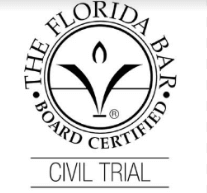Table of Contents

To win a wrongful death case in Florida, your attorney must prove the following three elements:
- The defendant owed a duty of care to your loved one.
- The death was caused by the negligence of another party.
- And lastly, that the decedent’s survivors have incurred financial losses as a direct result of the untimely death.
No matter what the circumstances, the unexpected loss of a loved one can be a heart-wrenching and traumatic experience. Florida has specific requirements on who can take legal action for the wrongful death of a family member, as well as evidence needed to have a successful claim.
Here at Kogan & DiSalvo, our legal team helps grieving families seek closure and a sense of justice following a loved one’s wrongful death. Litigation is an opportunity to hold negligent parties accountable for their reckless actions and to seek compensation for your emotional trauma, suffering, and economic losses.
Wrongful death laws in Florida
Under Florida Statute § 768.19, a wrongful death occurs when the death of an individual is caused by the negligence, wrongful act, default, or breach of contract or warranty of any party. The vast majority of wrongful death claims arise from unintentional incidents such as motor vehicle collisions, medical errors, workplace accidents, and injuries stemming from defective products.
To learn more about Florida’s wrongful death statutes and legal requirements, it’s best to work with a Stuart wrongful death lawyer who is well-versed in these complex cases. Our skilled attorneys have extensive experience handling wrongful death lawsuits in the Sunshine State, and know what it takes to efficiently resolve these claims with our clients’ best interests in mind.
It is our mission to ensure bereaved family members achieve justice after a sudden and unfortunate death that could have been prevented.
Proof needed to win a wrongful death lawsuit in Florida
The plaintiffs in a civil wrongful death claim must present a preponderance of evidence showing that the defendant’s negligence or actions caused the injuries and demise of their loved one. Under this “more likely than not” criterion, the burden of proof is met when the courts are presented with enough evidence to believe that the claim is most likely to be true.
For more clarity, let’s look at a wrongful death action arising from a drunk driving accident. As a motorist on Florida roads, the defendant had a legal duty to follow traffic rules and avoid harming others. By operating their vehicle after a few drinks, the intoxicated driver breached their duty of care.
The next step is proving that the drunk driver caused the collision, and that the accident resulted in fatal injuries and the decedent’s death. Your attorney would collect the following types of evidence to mount a strong claim:
- Blood alcohol (BAC) level results or breath test results that show the driver was legally intoxicated
- Testimony from the arresting officer
- Surveillance footage from the establishment where the drinks were consumed
- Empty containers of alcohol in the vehicle
- Results of field sobriety tests
- Forensic data
- Traffic camera footage
- Testimony from eyewitnesses
- Medical records/autopsy report of the deceased
Lastly, to recover monetary relief from the defendant, your legal counsel must prove that the loved one’s death affected family members and eligible dependents financially. Evidence must be presented that surviving family members suffered quantifiable harm. This can include medical bills incurred before the death; burial and funeral costs paid for by the estate; as well as lost income and benefits that the decedent would have earned in their lifetime while still alive.
In Florida, a wrongful death case can only be filed by the personal representative who has either been named in the decedent’s will or been appointed by the probate court. The personal representative can file a wrongful death lawsuit on behalf of the decedent’s children, parents, surviving spouse, and other relatives who were actively dependent on them for financial support.
Preserving evidence to support your claim
Grieving the death of a loved one can be a long and arduous process. Given the sensitive nature of these cases, plaintiffs are generally not in a position to worry about gathering medical records or other documents to advance a legal claim. Your lawyer can help you obtain necessary documentation, such as the death certificate and critical data that bolsters allegations in your case.
Your legal team will investigate and collect evidence that might be destroyed or lost, including pertinent medical records, witness statements, accident and police reports, funeral bills, as well as proof of supportive loss.
What kinds of damages can be sought in a wrongful death case?
The family and survivors of a person whose death was caused by negligence deserve to be compensated fairly.
Compensation for a wrongful death case may be sought through settlement negotiations or a jury trial. These monetary damages may include:
- Medical bills for injuries incurred before the decedent’s death
- Burial and funeral expenses
- The income or wages lost by the decedent between their injury and death
- Loss of the decedent’s financial contributions to the family and dependents
- Mental pain and suffering experienced by surviving family members
- Loss of the decedent’s parental companionship and guidance
- Loss of the decedent’s support, services, and protection
- Loss of spousal consortium
Florida statute of limitations for wrongful death
Like all states, Florida has strict deadlines – known as the statute of limitations – for seeking restitution after a wrongful death. If you fail to file your lawsuit within this stated time period, you are barred from seeking monetary damages. Under Florida law, family members and qualified dependents have two years to file a wrongful death case after the loss of their loved one.
If a misdiagnosis or some other type of medical malpractice is responsible for the death of a loved one, the law requires that lawsuits be filed within two years of the time the negligence is discovered or should have been discovered. Since these claims necessitate thorough investigations and planning, it’s best to contact the lawyers of Kogan & DiSalvo as soon as possible.
Kogan & DiSalvo attorneys are here to help

The senseless death of a loved one due to negligence has far-reaching repercussions. And when it comes to proving a wrongful death in Florida, it’s essential to partner with a law firm that you can trust.
Kogan & DiSalvo leverages decades of real-world experience helping families navigate the tragic loss of a loved one. For assistance filing a wrongful death claim in Florida, we invite you to schedule a free consultation today.
Our boutique Florida law firm handles wrongful death matters on a contingency basis, which means you don’t pay attorney fees unless your case is successful.








